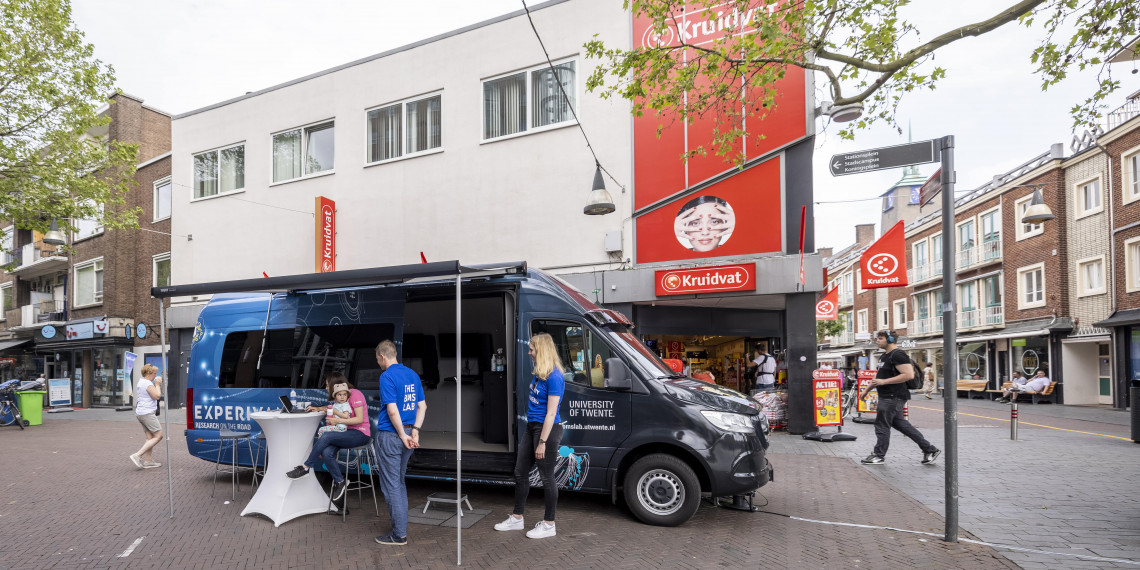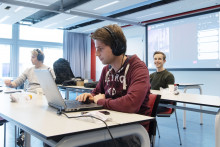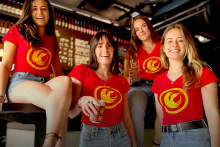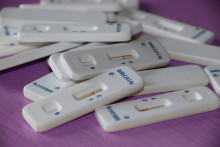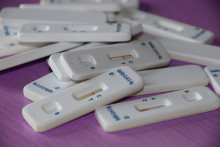In the centre of Enschede, there is little left to remind you of the pandemic. The sun is shining and the Van Heekplein is full of shoppers. There is a long ling outside the Primark, a street musician is playing his saxophone and a little farther off, a market vendor is loudly hawking his wares. He turns to a group of German tourists. ‘Sie sind Deutsch? Zwei für einen Euro!’
Amidst the usual hustle and bustle, a long blue Mercedes van looks somewhat out of place. ‘Well, there it is,’ says Jan-Willem van 't Klooster, managing director of the BMS Lab. The side of the van bears the slogan ‘Research on the road.’ This is the UT's mobile test lab, also known as the ExperiVan. Van ’t Klooster got up early this morning to get everything ready. ‘I had to make some final arrangements with the market manager. He asked me what we were selling. Apparently, not everyone has fully grasped the concept behind the ExperiVan yet.’
Willingness to get vaccinated
They're not selling anything. The ExperiVan has been parked on the Van Heekplein today to conduct a study into people's willingness to get vaccinated. ‘We want to find out how people feel about messages about the coronavirus vaccinations,’ Van 't Klooster explains. ‘In our ExperiVan, we show people different messages. Simply put, we want to study what effect each message has.’
Some of these messages have a neutral tone, while others are persuasive and positive, the director of the BMS Lab continues. The messages also come from different sources. ‘There is an underlying psychological theory, which states that our behaviour is determined by three basic psychological needs: autonomy, competence and connectedness. All these needs are addressed in our test. Take connectedness, for example. Who are people more inclined to believe when it comes to information about vaccination? Their general practitioner, the national government or an acquaintance?’
The goal is to reach out to as many different groups of people as possible on the Van Heekplein, Van ‘t Klooster explains. ‘We are particularly interested in people who do not want to get vaccinated and those who have not decided yet. In the Netherlands, we have thus far opted for a fairly neutral vaccination campaign that centres around people's freedom of choice. The question remains how that approach impacts the doubters. We hope to find representatives of this group on the Van Heekplein. There is a large diversity of people walking around here. It is nothing like the campus, where you'll mostly find highly educated test subjects. People from all walks of life come to the market to shop.’
‘This mobile lab helps us scientists climb down from our ivory tower’
In the lab
‘Shall we give it a go?’ Van 't Klooster asks. He opens the door of the ExperiVan, where two student assistants are hard at work setting up the equipment. ‘The ExperiVan is equipped for conducting research on the road, so it has everything we need. Just like on campus, we can create a stable laboratory setup here, with the same test conditions for every subject. That makes our research repeatable and the data we gather comparable.’
For the study of people's willingness to get vaccinated, the bus features two objective measurement methods, Van 't Klooster explains. ‘A facial expression sensor measures how the participant reacts to the campaign materials. The question is what expression the test subject displays. We also use a so-called eye tracker to measure whether or not the participant reads all the information and checks the source reference. We want to know whether the message is getting across to them. The major advantage of using these objective sensors is that we do not need hundreds of test subjects, as is the case with surveys. If we can test twenty-five people or so today and tomorrow, I'll be satisfied.’
In the meantime, the student assistant has finished their preparations. ‘Would you please sign this consent form first?’ The laptop is set up. ‘Please take a seat. Lean forward a bit. That's right. A little more. Perfect! Now your head is positioned correctly. Please follow the dots on the screen with your eyes.’
Several tweets appear on screen. The test subject is asked to rate their reliability and value. First up is a tweet from the National Institute for Public Health and the Environment (RIVM) about the effectiveness of the vaccination campaign. Next, general practitioner Willems emphasises how important it is that everyone gets vaccinated. There is even a tweet written by EO presenter Andries Knevel. Lastly, there is one @xxEmma_94.

Ivory tower
Outside, Van 't Klooster has struck up a conversation with a man riding a mobility scooter. The man is wearing an FC Twente jersey. ‘Whaddaya doin'?’ he asks curiously. ‘We are studying people's willingness to get vaccinated,’ Van 't Klooster answers. ‘Oh, I have already been vaccinated twice,’ the man replies. ‘I'm sorry, but you cannot take part in our study then. Perhaps you know someone who hasn't decided yet if they want to get vaccinated?’
Most people are curious about the ExperiVan, Van 't Klooster knows. ‘That is good, because this mobile lab helps us scientists climb down from our ivory tower. In my view, it also goes very well with the UT's Shaping 2030 vision, which states that the university wants to conduct more socially relevant research. We have come to Enschede with our van a few times and I notice that people are beginning to recognise the name of the BMS faculty.’ There is the occasional negative reaction as well, especially now that the study concerns vaccination. ‘Some people view the university as an extension of the government and therefore want nothing to do with us. However, the university certainly does not belong to the government. We pride ourselves on our independent research.’
Citizen science
The ExperiVan is part of the BMS Lab, which Van 't Klooster is in charge of. On the second floor of the Cubicus, circa 400 m2 has been cleared for researchers and students to experiment and rent mobile equipment. The BMS Lab helps them set up and perform their experiments.
The ExperiVan was added to the arsenal two years ago. A fully stripped van was bought from a car dealer in Twente. The next summer, Van 't Klooster borrowed a camper and went on holiday in it, together with his wife, to discover first-hand the best way to pack such a vehicle. After his holiday, he brought the UT van to a company that converts the police force's ME vehicles. To top it all off, a secretary came up with the winning name: the ExperiVan.
‘It is good of the university to come to the centre of Enschede’
The mobile lab was deployed several times over the past two years, e.g. for a study of zoonoses: diseases that can jump from animals to humans. ‘Back then, we were parked on the other side of the van Heekplein,’ says lecturer Nienke Beerlage-de Jong, who was in charge of that study. As a member of the HTSR (Health Technology and Services Research) department, she is also involved in the study of people's willingness to get vaccinated, which is supervised by UT Professor Vera Araujo-Soares.
‘The BMS faculty set up a fund for research related to COVID-19,’ Beerlage-de Jong explains. ‘Our proposal for a study of people's willingness to get vaccinated was selected as one of the winners of an internal competition.’ The lecturer knows that the Ministry of Health, Welfare and Sport is curious about the results of the study. ‘We will ultimately share our findings with the ministry as well. They want to provide information to the doubters as effectively as possible. On top of that, the lessons learned from this study can also be relevant during a possible future pandemic.’
Beerlage-de Jong is excited about the ExperiVan. ‘For us, it is a fantastic way to reach out to people. I think this is a great example of citizen science, for which citizens are actively involved in scientific research. It doesn't get any more accessible than this.’
Put into practice
The student assistants are talking to a married couple from Syria. While the father takes a seat in the ExperiVan, the mother waits outside with their youngest daughter. After a while, they switch places. ‘I particularly liked the short messages,’ the wife says afterwards. ‘My Dutch isn't that good yet and those were easier for me to understand. I also liked the tweets that said you're not only doing it for yourself, but also for elderly people around you.’
They both plan on getting vaccinated. ‘With this information, I do have more faith in the vaccine,’ the mother says. ‘You read a lot on social media about the vaccine being unreliable and how you can still get infected with the coronavirus after a few months. At least now I know that - if you do get infected - you will not get as sick if you have been vaccinated than you might otherwise become.’
‘It is good of the university to come to the centre of Enschede,’ she continues. ‘There are many different cultures here. I imagine it is quite different here than at the university itself. I especially liked the messages from the government and the general practitioners. I don't know where the ‘regular people’ get their ideas.’
As the family continues on its way, the student assistants and researchers begin looking for a new test subject. That proves to be quite a challenge today; it is a German bank holiday and it is hard to pick out the Dutch people amidst the German tourists. The market salesman around the corner couldn't care less. He has clearly rehearsed his speech in many languages. ‘Jetzt ein Kilo für einen Euro!’


